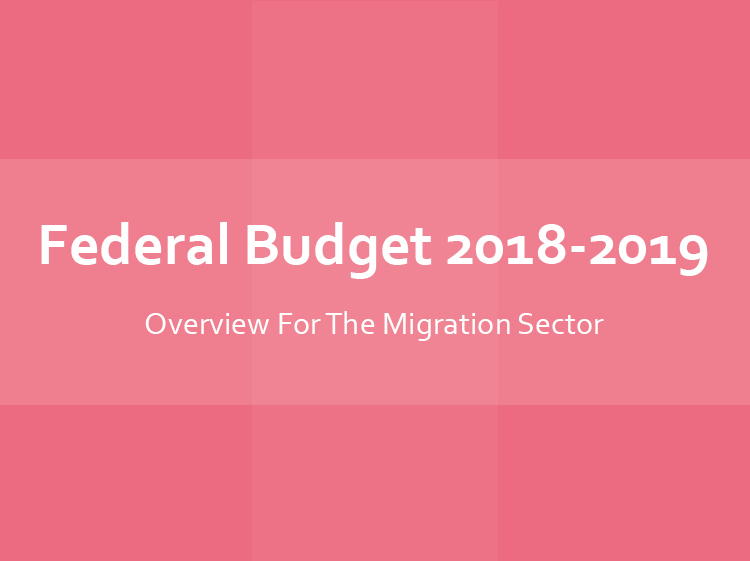The 2018-19 Federal Budget was handed down last tonight and included the following elements impacting the immigration program, migrants and work within the immigration sphere.
The main components relate to the management of unlawful non-citizens, providing migration and citizenship services and refugee and humanitarian assistance.
The cost of managing unlawful citizens is expected to drop by 37% as a result of forecasted lower numbers of onshore and offshore detainees, from $2,960 million to $1,873 million.
The cost of providing migration and citizenship services is estimated to be reduced by 8.5%, from $807 million to $744 million.
The cost of regional co-operation and refugee and humanitarian assistance will be reduced by 6.5% from $462 million to $432 million.
The Budget Portfolio Paper notes that revenue from Visa Application Charges (VAC) is expected to increase to $2,541.7 million in 2018–19, an increase of $394.4 million over the 2017–18 estimates. There is no detail of how this increase will occur apart from the statement that …’the increase is primarily due to previous Budget measures, which impacted visa applications and pricing and, to a lesser extent, new measures’.
Border Force funding announcements
- $122 million to increase police and border force presence and capability at nine major domestic and international airports.
- Additional investment to improve scrutiny of visa processing and passenger screening, and clearance of visitors and goods at our borders.
- $130 million to upgrade the Department of Home Affairs’ ICT infrastructure for visa processing, identity management, and threat analysis.
Visa program changes
Visas for General Practitioners — targeting areas of doctor shortages from 2019
The Government will improve the targeting of visas for general practitioners to areas of doctor shortages.
From 1 January 2019, the Government will set a planning target of around 2,100 overseas trained doctors per annum to contribute to the continued growth in overall doctor numbers.
Visas for other specialties and for state and territory based employment will not be affected.
Retirement visas – permanent pathway
A pathway to permanent residency for holders of Retirement (subclass 410) and Investor Retirement (subclass 405) visas will be introduced. A portion of the parent permanent migration places will be quarantined for retirement visa holders each year.
Retirement visa holders in Australia will be eligible to apply onshore for a permanent visa through the Parent (subclass 103) or Contributory Parent (subclass 143) visa streams.
Retirement visa holders will be exempted from some parent visa requirements that they would typically be unable to meet, such as having family in Australia. The pathway will remain open until all retirement visa holders who wish to transition to permanent residency have done so.
As part of the establishment of the pathway, the Government will close the subclass 405 visa to new applicants. The subclass 410 visa is already closed to new applicants.
Peru / Australia Free Trade Agreement
It is expected that this agreement will be added to the list of those countries exempt from labour market testing.
Skilling Australians Fund
Further refund provisions added
Refund provisions for the Skilling Australians Fund levy will be expanded. Refunds of the levy will be made in the following circumstances:
- the employer’s sponsorship application is approved but the employee’s subsequent visa application is refused on health or character grounds
- the sponsorship and visa applications are approved but the visa holder does not commence work with the employer
- a Temporary Skill Shortage (subclass 482) visa holder leaves their employer within the first 12 months of employment where the visa period was for more than 12 months. Refunds will only be available in this scenario for unused full years of the levy
These provisions are in addition to the existing refund provision for circumstances in which an employer’s sponsorship application is refused.
* This levy has not been legislated yet which means that there is a short window of opportunity before it is enacted for sponsors to lodge their nominations without paying the levy.
Exemptions for religious workers
The Government has also announced that it will exempt religious organizations from paying the SAF levy for Temporary Skill Shortage (subclass 482) or Employer Nomination Scheme (subclass 186) visas under the Minister of Religion Labour Agreement or a company-specific Labour Agreement, covering bishops, ministers of religion and religious assistance.
However, this will be at a cost of $105.1 million over the forward estimates period. While the Government will provide $1.8 million to the Department to implement the measure, the equivalent amount will be deducted from the revenue available for payments to the States and Territories through the Skilling Australians Fund.
The commencement of the Skilling Australians Fund levy is subject to the passage of legislation through the Parliament.
Humanitarian and refugee assistance
The Government intends to streamline employment servicing arrangements for newly arrived refugees.
Newly arrived refugees receiving activity tested income support would be eligible for full jobactive services after 26 weeks of being registered for income support payments, rather than after 13 weeks.
This measure is designed to improve the sequencing of services available to refugees through programs such as the Humanitarian Settlement Program, the Adult Migrant English Program (AMEP) and jobactive, assisting refugees to focus on settlement and improving language skills during the first 26-week period of their arrival.
Optional access to jobactive Stream A (Volunteer) will be available to refugees who already have good English language skills from six weeks after their arrival.
Refugees eligible for jobactive will also have access to tailored employment services such as workplace-specific English language training. This would include those individuals who have exhausted their AMEP training hours and cultural awareness training. Get in touch with our migration agent Melbourne for more information.



